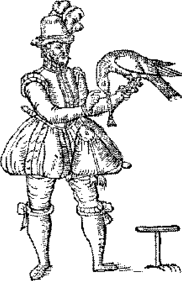Equivocation, famine--and hawking
To equivocate is to be deliberately ambiguous--and equivocation was in the air when Shakespeare wrote Macbeth. The Porter reminds us of the fear many Elizabethans had for what they saw as the clever manipulation of the Jesuits in England.
The Porter sees Hell as welcoming all those who employ deliberate ambiguity: a priest in his trial, a farmer in seeking higher prices, a tailor in cheating on the material he uses.
By contrast, Macbeth himself is sometimes horrifyingly direct, especially if the full meaning of his imagery is clear. An example is the submerged image of hawking in Macbeth's invocation to night: "Come seeling night, / Scarf up the tender eye of pitiful day" (3.2.46-47).
- Hawking, and Seeling night
